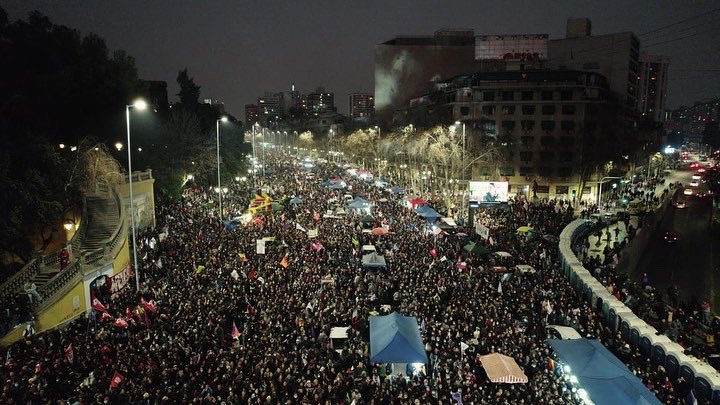This Sunday, on September 4, Chileans will vote to decide whether to “approve” or “reject” a new constitution, which has been drafted by a democratically elected gender-equal convention. It is said to be one of the most progressive constitutions in the world, and addresses the country’s stark social inequalities.
Chile’s current constitution was written and imposed in 1980 under the US-backed military dictatorship of General Augusto Pinochet (1973-1990). Several social movements, trade unions and progressive sectors have argued that it enshrined a neoliberal economic model, which favors private interests and prevents any substantial social change to the system. This Sunday, over 15 million Chileans will have the opportunity to replace it and enter into a new era of social justice.
Thursday, September 1, was the last day of the campaign, and it was marked by mass mobilizations for and against the proposed constitution in the capital Santiago. Over 500,000 people gathered on Alameda Avenue in downtown Santiago for the closing of the ‘I Approve’ option campaign. Supporters wore face masks with the photo of former president Salvador Allende, and expressed their hope to witness a new dawn on Monday, September 5. The rally was joined by renowned artists, political leaders as well as victims of the police repression during the social outbreak of 2019.
Deputy Karol Cariola of the Communist Party of Chile, spokesperson of the ‘I Approve’ command, said that “we have hope, we undoubtedly have the dream that we will be able to leave behind the Constitution of abuses.”
Chile está unido por derechos, por avances y por esperanza en un país mejor!❤️🙌
Hoy día en la Alameda lo demostramos y lo demostraremos este domingo en las urnas 🗳
Este #4deSeptiembre, #ChileVotaApruebo 🇨🇱 pic.twitter.com/HUN7B7Myvi
— ApruebaxChile 🅰️ (@ApruebaxChile) September 2, 2022
Meanwhile, the closing of the ‘I Reject’ option campaign was held at the Pablo Neruda Amphitheater of the Metropolitan Park and was attended by some 500 people, without the participation of major artists or politicians.
The proposed new constitution, drafted for a year by the members of the Constitutional Convention and presented in July, establishes numerous remarkable progressive changes. It enshrines gender equality in all public institutions and companies, recognition of domestic work, respect for sexual diversity, Indigenous peoples’ right to self-determination, protection of the environment, and water rights. It guarantees social rights such as affordable healthcare, education, housing, and decent pensions. It responds to the demand of Chileans to provide for a more equal, inclusive and participatory democracy.
Nevertheless, the proposed constitution has been repeatedly attacked with misinformation and bitterly divisive campaigns in mass media and social media by the wealthy and conservative sectors. Since July, the right-wing have led an aggressive campaign against the constitutional change, arguing that the draft would shift the country too far left, or that it is too ambitious and difficult to turn into efficient laws.
The progressive and social sectors have tried to deal with it with door-to-door campaigns and dialoguing with the citizens in fairs throughout the country.
Opinion polls suggest that Chileans will reject the proposed draft constitution in the referendum. The ‘I Reject’ option is leading by 10%. The category of undecided, which represents about 15%, will define the result of the plebiscite since the voting is mandatory for all citizens aged 18 and above.





